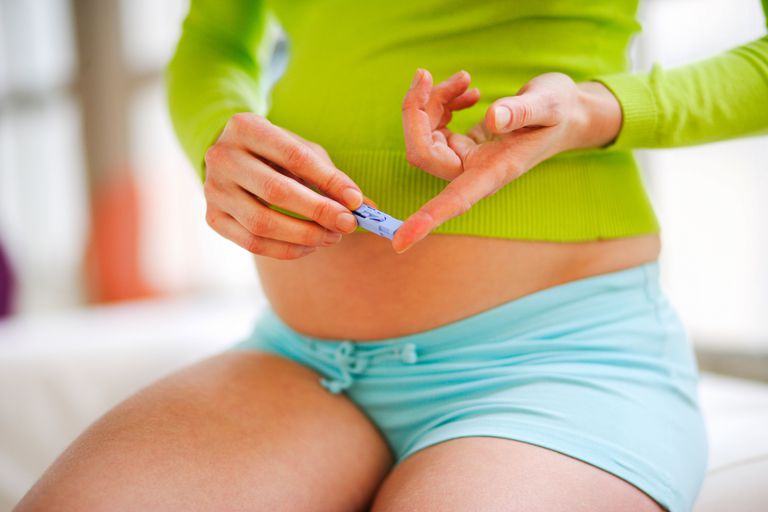|
Delivering a child and recovering from its effects are treated as a rebirth for women. Pregnancy brings about joy and happiness but also a sense of anxiety in the mom-to-be as she starts to fervently wish for a safe delivery and a healthy infant. Some start feeling hungrier, wish to eat all sorts of food available and still there are many who practice the age-old concept of ‘eat for two’. Insulin secretion and sensitivity increase which thereby increase the amount of maternal fat and glycogen storage. More than external factors there are various factors from within the woman such as the placental hormones that serve as insulin antagonists. Normally, a pregnant woman undergoes increase in insulin secretion to overcome insulin resistance but sometimes, the pregnant women becomes unable to regulate insulin secretions and starts showing signs of gestational diabetes.
Forerunner to Type 2 Diabetes Gestational diabetes mellitus (GDM) is a sign of glucose intolerance that’s exposed initially during pregnancy which occurs in almost 7% of pregnant women. This phase is temporary in most pregnant women and glucose levels stay balanced after delivery negating any need for diabetes medications. But suffering from gestational diabetes during pregnancy exists as a significant risk factor for developing type 2 diabetes later in life. This is a clearly evident result of a study involving more than 800 participants who were diagnosed with gestational diabetes between 1996 and 2003. It showed that almost 12.5% women developed type 2 diabetes within two months of delivery and during the next ten years the number of women who were classified as diabetics steadily increased at the rate of 6.8% per year. This study included a thorough research on Asian women and came to the conclusion that almost 50% of Asian women with gestational diabetes were at a risk of developing type 2 diabetes in the next eight years of childbirth. The research team followed up on 370 participants for more than a year after childbirth. 105 of them developed type 2 diabetes within two months of childbirth and the rest were unable to participate in the follow up study. Women either developed diabetes within two months or took a significant amount of time (a year or so) to become a diabetic. When analyzing for the difference in duration before developing diabetes they came with the reason that defect in insulin secretion was the primary reason for developing diabetes early during postpartum period. These women also displayed a variation in the HHEX gene that’s majorly associated with Type 2 diabetes. Whereas, women who showed a slower ability to become glucose intolerant showed changes in the CDKAL1 gene that’s also associated with type 2 diabetes. Risk Factors for Gestational Diabetes Progressing into Type 2 Diabetes
Comments are closed.
|
AVOID FRAUD. EAT SMART.+91 7846 800 800
AuthorDietitian & Nutritionist Dr. Nafeesa Imteyaz. Archives
July 2024
Categories
All
Dr. Nafeesa's Blog @blogspot |
- Home
- Written Testimonials
- Consult
- Clinics
- Blogs
-
Diet & Nutrition
- Diabetes Reversal
- IVF IUI not needed for PCOS PCOD Infertility
-
Medical Nutrition
>
-
Disease & Conditions
>
- Infertility | PCOS
- Diabetes Mellitus
- Cholesterol
- Hypothyroid
- Kidney Problems
- Hypertension
- Cardiovascular Diseases
- Liver Diseases
- Gastro intestinal disorder
- Cancer
- Metabolic Disorders
- Orthopedic Disorders
- Eating Disorders
- Dietary Recall
- Weight Record Filled By Clients
- Online Payment Transaction Details
- Online Clients Weight Check Form
- Our Program Package Service Charges
- Weight Record 2017 Clients
- Measurements sent by Clients
- Terms & Conditions Of Payment
- Thanks. Your Form is Submitted
- Video Testimonials
- Lifestyle & Wellness
- Lifestyle & Wellness Blog
- Allergy & Intolerance
- Weight Loss / Gain
- Weight Loss / Slimming Blog
-
Disease & Conditions
>
- Life Cycle Nutrition >
- Sports Nutrition >
- Integrity in Nutrition
- Knowledge Centre
© COPYRIGHT 2022. ALL RIGHTS RESERVED. FRST HEALTHCARE PVT LTD.
Dr. Nafeesa Imteyaz of First Eat Right clinic, is the Best Dietitian Nutritionist in Bangalore. Best Dietitian Nutritionist in Pune. Best Dietitian Nutritionist in Hyderabad. Best Dietitian Nutritionist in Chennai. Best Dietitian Nutritionist in Mumbai. Best Dietitian Nutritionist in Delhi. Best Dietitian Nutritionist in Kolkata.


